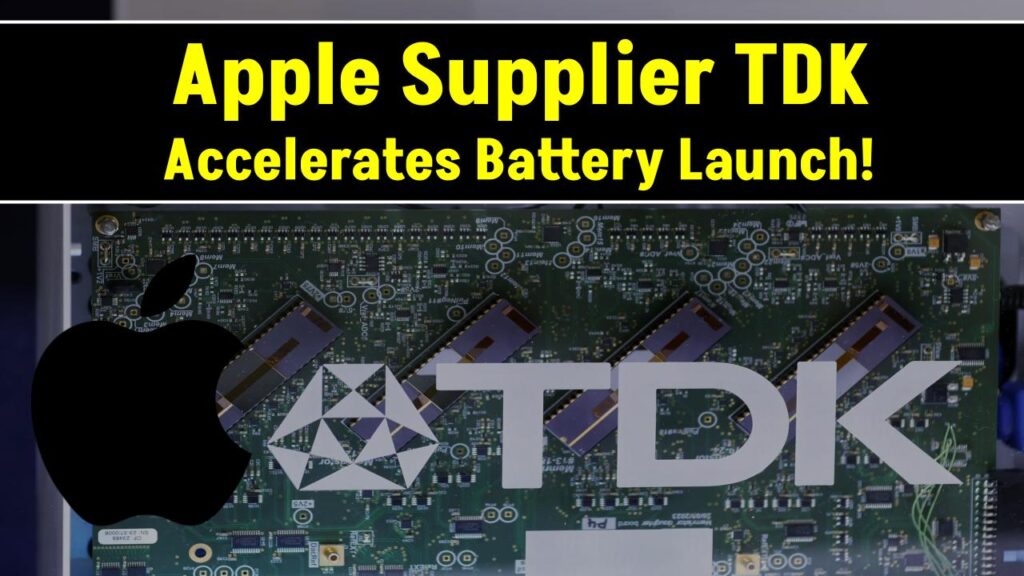Apple Supplier TDK: In a move set to shape the future of mobile technology, Apple supplier TDK has accelerated the launch of its third-generation silicon anode batteries, marking a significant step in next-gen power solutions. These advanced batteries come at a time when AI-powered devices are becoming increasingly common and demanding more from traditional power sources. Whether you’re a tech enthusiast, an investor in energy innovation, or simply curious about the next iPhone, here’s why this TDK battery breakthrough matters to you.

Apple Supplier TDK
| Feature | Details |
|---|---|
| Company | TDK Corporation (Official Site) |
| Breakthrough | Third-generation silicon anode battery technology |
| Advantage | Up to 40% higher energy density over graphite-based batteries |
| Impact | Longer-lasting, more powerful batteries for AI-powered smartphones and wearables |
| Capital Investment | Over 50% of TDK’s CAPEX to go into energy segment over the next 3 years |
| Industry Impact | Consumer electronics, EVs, IoT, renewable energy |
| Launch Timeline | 3rd-gen battery now; 4th-gen in 2026 |
| Applications | Mobile AI, wearables, IoT, EVs, portable health tech |
TDK’s accelerated launch of its third-generation silicon anode batteries is more than just a product update — it’s a technological shift with wide-reaching implications. As devices become smarter and AI becomes a standard feature, the need for compact, long-lasting, and powerful batteries is more critical than ever. TDK’s innovation puts them at the forefront of that energy revolution. From smartphones to electric vehicles, this battery breakthrough could transform the way we power our lives. With even more advancements on the horizon, it’s clear that TDK is charging into the future — and taking us with them.
Why TDK’s Silicon Anode Battery Technology Matters
To understand this leap, let’s first break down how batteries traditionally work. Most of today’s devices use lithium-ion batteries with graphite anodes. While effective, these batteries have hit a plateau in terms of energy density — how much power can be packed into a given size. TDK’s new silicon anode batteries solve that problem by replacing graphite with silicon, a material that can hold up to 10 times more lithium ions. The result? Smaller batteries that last longer and perform better.
“This could be a game-changer for compact devices where space is limited but power needs are growing exponentially,” says Dr. Hideo Ito, energy storage expert at Kyoto Tech University. These benefits are especially important in the AI era, where mobile devices must run complex algorithms locally — from real-time translation to visual recognition and autonomous decision-making.
Practical Benefits for AI-Powered Devices
AI chips, like Apple’s Neural Engine or Google’s Tensor Processing Unit, require high-performance energy sources to function optimally. Here are some real-world examples of how TDK’s batteries can change the game:
Smartphones
Modern phones are doing much more than calling and texting. With AI features like Siri, photo enhancement, and AR apps, batteries drain fast. TDK’s solution could extend daily battery life by 30-40% without making the phone bulkier.
Wearables & Health Devices
Devices like the Apple Watch or fitness trackers are growing in complexity. They run sleep monitoring, ECG, and AI-driven health analytics. A higher-density battery allows these wearables to run longer and do more without needing frequent recharges.
Portable AI Assistants
Think of AI translators, smart earbuds, or pocket-sized AI tutors. With better batteries, these tools can offer real-time computing for extended periods — critical for travel, education, or accessibility.
Industry Impact Beyond Consumer Devices
While smartphones and wearables are immediate beneficiaries, the implications go far beyond.
Automotive Sector
Electric vehicles (EVs) rely heavily on battery innovation. A smaller yet more powerful battery can mean greater range, lighter cars, and lower production costs. TDK’s tech may eventually find its way into next-gen EV platforms.
Renewable Energy Storage
As the world shifts toward solar and wind energy, there’s a growing need for efficient, compact energy storage. TDK’s silicon anode tech could support grid storage systems that are smaller, safer, and longer-lasting.
Internet of Things (IoT)
From smart cities to connected homes, IoT devices demand energy efficiency in compact forms. Higher energy density enables smaller, smarter, and longer-lasting sensors and actuators.
TDK’s Strategy and Investment Plan
TDK isn’t just dabbling in energy. According to a Reuters report, the company is committing over 50% of its capital expenditure over the next three years specifically to battery development. That means more resources, faster production cycles, and quicker innovation. The fourth-generation battery — said to be even more energy-efficient — is expected to launch in 2026.
“Our mission is to support the energy needs of AI-driven technology,” says TDK CTO Kiyoshi Nakamura. “We see batteries as the new frontier of tech innovation.”
A Simple Guide: How Silicon Anode Batteries Work
- Traditional Batteries: Use graphite as an anode material. Graphite is stable but has limited storage capacity.
- Silicon Anode Batteries: Replace graphite with silicon, which stores more lithium ions, hence more energy.
- Challenges: Silicon expands when charged, which can lead to cracking. TDK uses nanostructured silicon to manage expansion and ensure durability.
- Benefits: Higher density, longer battery life, and faster charging capabilities.
Apple Is Using AI to Boost iPhone Battery Life: Check What This Means for Your Next Upgrade
The M4 MacBook Air 2025 Is Here: Why Tech Experts Say This Is Apple’s Most Shocking Move Yet
Apple’s Smart Glasses with Custom Chips Coming — Check What to Expect By 2027
FAQs on Apple Supplier TDK
What is a silicon anode battery?
A silicon anode battery replaces traditional graphite in lithium-ion batteries with silicon, offering higher energy capacity and faster charging.
Why is this important for AI devices?
AI devices need constant and high power to process complex tasks. Better batteries mean better performance without overheating or size increases.
Will this technology appear in the next iPhone?
While TDK supplies Apple, there’s no official confirmation. However, industry insiders speculate that future Apple AI devices will feature this advanced battery tech.
Is this technology safe?
Yes. TDK has engineered the batteries with advanced materials that reduce swelling, overheating, and leakage.
Can this be used in electric vehicles?
Not yet at scale, but future integration into EVs is highly likely due to the density and scalability of the technology.





